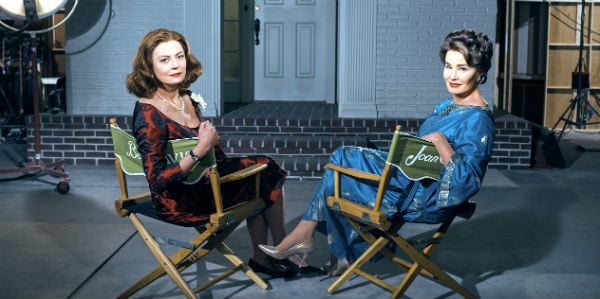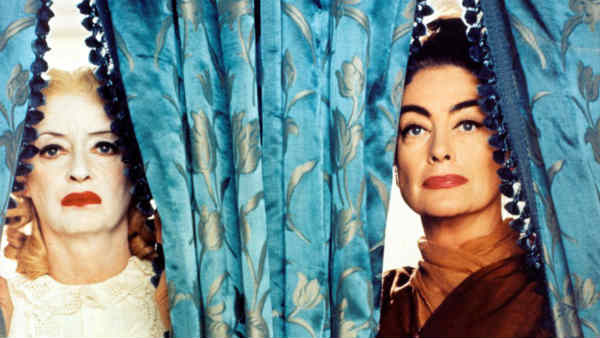 After watching five episodes of FX’s “Feud: Bette and Joan,” and two days of the NFL Combine, I’ve come to a conclusion: nothing in a career is guaranteed, not at the beginning nor at the end.
After watching five episodes of FX’s “Feud: Bette and Joan,” and two days of the NFL Combine, I’ve come to a conclusion: nothing in a career is guaranteed, not at the beginning nor at the end.
The inaugural season of the anthology series “Feud,” which premiered on Sunday, March 6, at 10 p.m. ET/PT, focuses on the long-running dispute between Hollywood megastars Joan Crawford (Jessica Lange) and Bette Davis (Susan Sarandon), who came together at a low point in their respective careers to shoot the hit horror movie “Whatever Happened to Baby Jane?”
Apparently Crawford and Davis hated each other, for a variety of personal and professional reasons. But, as both hit their 50s in the early ’60s, work began to dry up. So Crawford set out to find herself a project and came across the 1960 novel “Whatever Happened to Baby Jane,” by Henry Farrell, about unbalanced former vaudeville child star “Baby” Jane, and her paraplegic sister, Blanche.
Crawford took the book to director Robert Aldritch (Alfred Molina) and lobbied to have Davis in the lead role. But the squabbling and rivalry continued throughout production and promotion of the movie — all chronicled in “Feud” by gossip maven Hedda Hopper (Judy Davis).
As a framing device, the series uses the shooting of an interview documentary, with fellow actresses Olivia de Havilland (Catherine Zeta-Jones) and Joan Blondell (Kathy Bates) commenting on the duo and the general treatment of women in Hollywood.
Much is made throughout the five episodes about the drying up of work for older actresses — which continues today, with a few notable exceptions (Meryl Streep, Judi Dench, Helen Mirren) — and how hard it is for a woman to work in a man’s world (which it can be — not that it’s all that much easier for men in a man’s world; it’s just harder in different ways).
But at the same time, both Crawford and Davis had periods in their careers when they were on top of the game, making good money and becoming very famous. How they chose to spend or save that money, deal with the fame, and so on, was up to them. Frankly, both of them made some very poor personal choices.
Most actors, male or female, never become as successful as these two, and they certainly aren’t as fondly remembered. Most actors don’t work at all, or at least not very much.
Some have success early, and it evaporates. Others have success later. A good number never become big stars, but they work steadily, live within their means, don’t get into drugs or alcohol, and enjoy a comfortable retirement.
Others hit big, flame out and go broke — both male and female.
Does a focus on looks make maintaining a career harder for actresses? Yeah, no doubt. But, you know what, it’s not the only profession where your body determines your success.
Every year, the NFL Combine — held this year in Indianapolis — brings together top college football players and puts them through their paces for the benefit of NFL scouts. These are the cream of the college crop, and don’t even include the scores of players who don’t get invited to the Combine. Behind each of the young men straining their bodies to show off for future possible teams are many disappointments and dashed hopes.
There’s no guarantee that those in the Combine will get drafted, or, if they get drafted, that they’ll make it through training camp. And if they get that far, they may get cut in a month or a year or two years …
The average NFL career is 3.3 years, according to the NFL Players Association — meaning half the careers are shorter even than that. Unless you have a skill to fall back on, or managed to actually get a good education along the way, this may be the entire window of time a player has to make enough money to last him for decades.
The Combine is a brutal process, in which an inch of length, a second of speed, or a foot of distance can make all the difference. But, some undrafted players persevere and manage to get themselves on a team, a gamble that doesn’t always pay off.
Like actors, the careers of football players depend on innate ability, preparation, performance and a lot of luck. And it all can come to a crashing halt, with no warning and no recompense. One moment you’re a demigod, the next, a has-been.
Truthfully, any job that depends on your physical skills — from construction to lumbering to fishing to trucking, you name it — can end at any time, if your body gives out. And most of these jobs never have the high-end earning potential of movie stars or NFL players.
Nobody likes it when a career fizzles out. But, Crawford did do one thing that’s always available — when nobody would give her work, she sought it out and fought to get a production off the ground.
And each of those young men at the Combine, if their NFL dreams don’t play out — or even if they do — will face a similar moment of reinvention, and hopefully, resurgence.
To me, that’s the lesson of “Feud.” You’re gonna fall, but you don’t necessarily have to stay down.
WARNING: There’s some very rough language in “Feud,” including a word in the premiere not usually heard on ad-supported cable, but, at least in what I saw, no violence or explicit sexual content. Plenty of smoking and drinking, though.
Image: Courtesy FX/Warner Bros.
Don’t miss a thing: head over to my other home, as Social Media Manager at Family Theater Productions; and check out FTP’s Faith & Family Media Blog.














